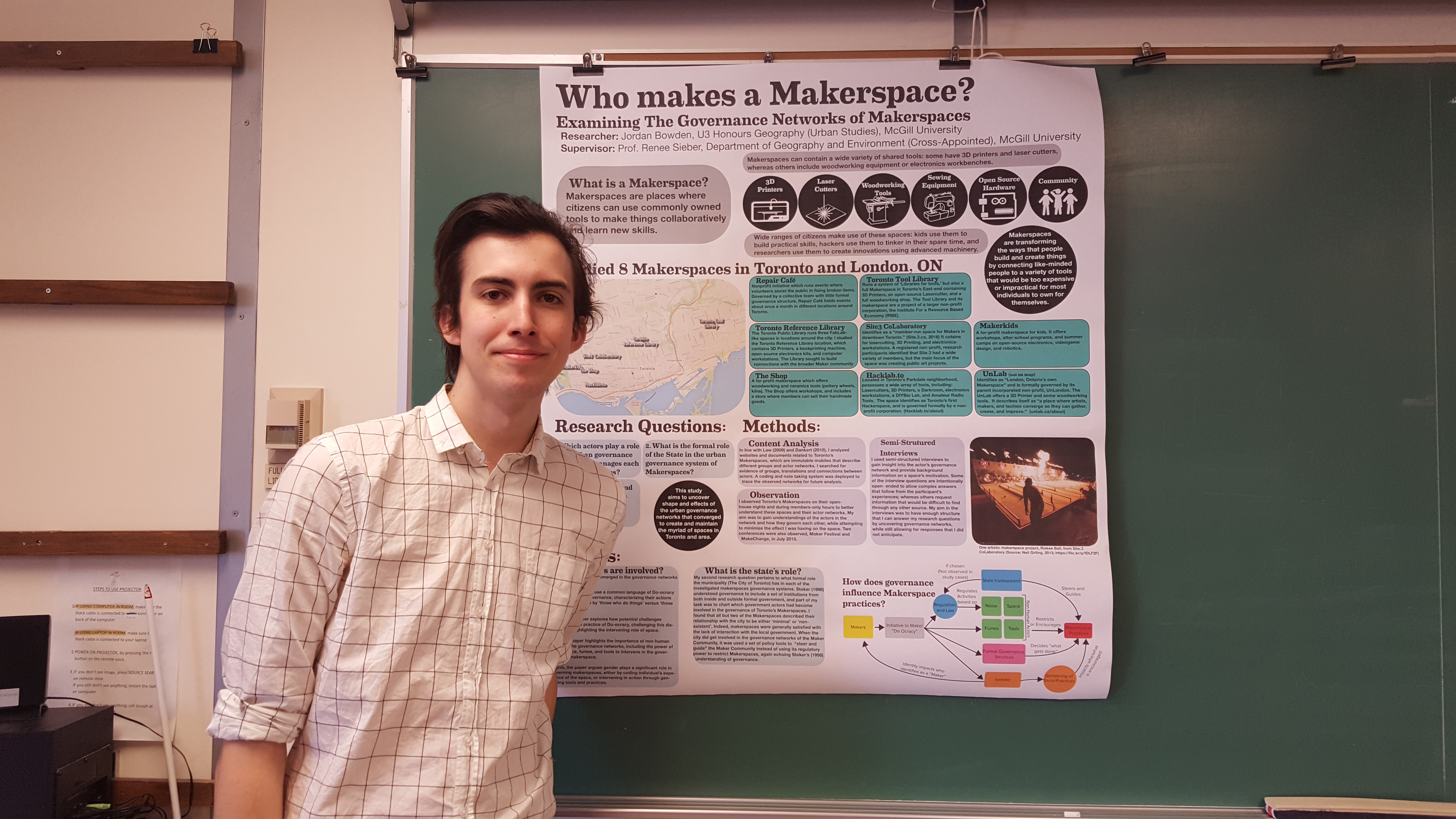
A McGill University undergraduate has undertaken unique research on the governance of Toronto’s Makerspaces as his honours thesis project.
By Drew Bush
Google “Makerspaces” and you might not understand the definition you’re reading. First popular in China and other Asian countries, these do-it-yourself (DIY) spaces where people can gather to create, invent, and learn have also spread to the United States and, most recently, Canada.
Many are located at libraries where they include tools such as 3D printers, software, and electronics while others include craft and hardware supplies, online sites, tools, and more. People go to these social spaces to build and invent often with expensive, specialized equipment, while teaching and learning from their peers.
In research funded by a McGill University Arts Undergraduate Research Internship Award (ARIA) and Geothink, one student has found a huge variance between the types of spaces found in Toronto. The city’s groups represent what McGill University Undergraduate Jordan Bowden calls a unique Canadian evolution of the Makerspace concept. Many of Canada’s Makerspaces face little formal regulation and differ greatly from their formulations than in other countries, he added.
“My research tries to make the argument that there are sort of intervening factors between the actual desire to make stuff and start a Makerspace and the actual production of the thing,” he says of research he conducted into how 11 different Toronto Makerspaces are governed in the summer of 2015. His work was undertaken with the supervision of Geothink Head Renee Sieber, associate professor in McGill University’s Department of Geography and School of Environment. It will constitute his soon-to-be-submitted undergraduate honours thesis.
“It’s interesting because there are so many actors which have emerged in my research that participate,” he added. “Ranging from the local government, which has been involved only in a limited extent in the way that they fund maker events. Like there’s a big festival called the maker festival. And there’s also more formal like funding agencies. But it’s interesting they only fund very particular aspects of Makerspaces. So they’re only interested in more entrepreneurship focused endeavours versus artists.”
One of the main differences in the Toronto Makerspaces where Bowden conducted his interviews was the manner in which they were governed. At first, he focused his research on looking at the way formal provincial or federal agencies regulate what Makerspaces can build or how much noise they might make. But he didn’t find any evidence of the province or federal government regulating these spaces.
Bowden also believed he’d be able to interview a wide number of people and groups. But that didn’t pan out during the summer he spent observing different Makerspaces around the city and going to maker related events. What he found instead was a need for longer more in-depth interviews with fewer groups that possessed a wide variety of organizational structures. These interviews make up the core of his thesis research and include non-profit boards, for profit companies, groups of artists, local library groups, and spaces run by the government.
“Governance matters, [and] a wide variety of actors, including nonhuman, play a role in the governance system,” Bowden said of the Makerspaces he examined. Interestingly, the idea of governance within these spaces also varies greatly, he added.
“I use the term a lot in the paper, urban governance systems,” Bowden said. Such governance systems can shape a Makerspace’s existance and what people actually make, he added. There are a multitude of factors which restrict or enable what makers create in the space, like noise, tools, or the organizational factors.
Bowden has personal experience with such intervening factors. He’s been involved in the Makerspace community for quite some time, originally out of interest in a corporate project using a 3D printer. It’s led him to believe that there’s not much research right now on the different Makerspaces emerging in the Canadian context. In particular, he says, not much has been written on the differing contexts and mechanisms by which they’re governed.
“It’s been a year long project, which is actually a bit more extensive than the usual honours theses are,” he said. “It’s been great because I’ve been able to do field research which a lot of people wouldn’t do for undergrad thesis. Including interviews. So it’s really been a really great experience for me in terms of getting a good feel for research and doing field research as well.”
Find out more about Makerspaces and how Bowden conducted his research in Geothoughts Podcast 10: Governing Makerspaces in Toronto with Jordan Bowden.
If you have thoughts or questions about the article, get in touch with Drew Bush, Geothink’s digital journalist, at drew.bush@mail.mcgill.ca.